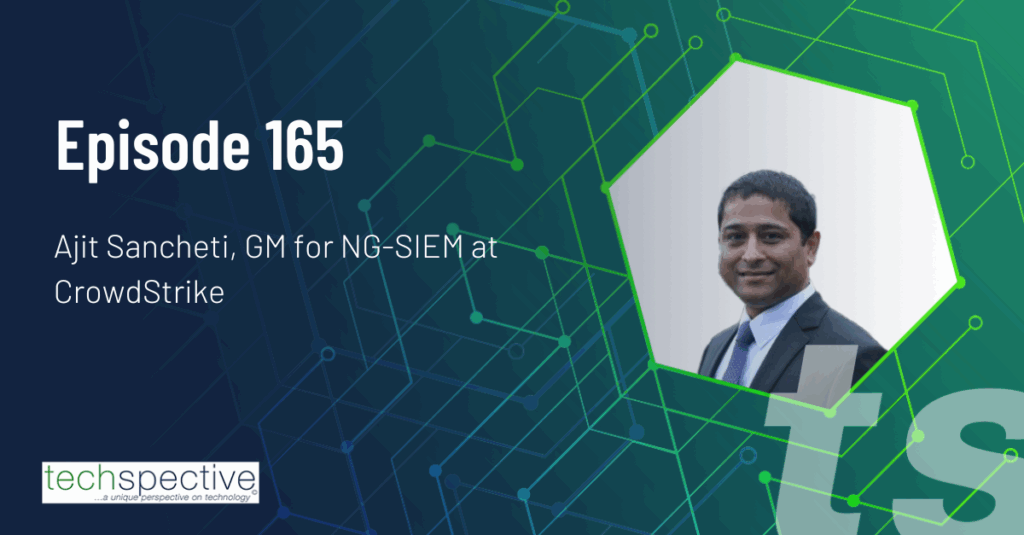Podcast: Play in new window | Download
Subscribe: Apple Podcasts | RSS
Security teams know the pressure all too well: attackers move faster, the attack surface expands every year, and the tools meant to protect enterprises often create more friction than clarity. Traditional SOAR platforms promised efficiency but often delivered complexity, inflexibility, and frustration. Now, a new wave of AI-driven automation is reshaping the conversation—and the stakes couldn’t be higher.
In the latest episode of the TechSpective Podcast, I sat down once again with Ajit Sancheti of CrowdStrike to dig into what this next chapter of automation really looks like. If you’ve listened to Ajit before, you know he has a talent for breaking down complex cybersecurity challenges into practical, human-focused insights. This time, our discussion centered on the intersection of agentic AI and the modern SOC—a space where innovation and risk run side by side.
Why Old SOAR Models Fell Short
We start off with a reality check on traditional SOAR solutions. Many organizations invested heavily, only to find themselves burdened by rigid workflows, brittle integrations, and tools that couldn’t keep up with evolving threats. The issue often revolves around whether security teams can adapt responses in real time without breaking the system.
Ajit offers a perspective on why legacy approaches struggled to gain traction and how attackers’ increasing use of AI has made flexibility and speed non-negotiable. That tension—between what defenders need and what their tools can actually deliver—sets the stage for where agentic AI enters the picture.
Agentic AI: Promise and Caution
If generative AI brought us new ways of working with text and language, agentic AI goes a step further: it doesn’t just generate, it acts. That opens doors for SOCs to automate targeted, granular responses at machine speed. But it also introduces a new kind of trust problem.
How much autonomy are you comfortable handing over to an AI agent? What happens when it makes the wrong call? Ajit and I explore the idea of “earned trust”—why human oversight will remain essential and why AI “performance reviews” might become as routine as employee evaluations.
It’s a fascinating parallel: treating these agents not just as tools, but as teammates that require accountability.
The Human Factor in Automation
One theme we return to often in our discussion is simplicity. For too long, security technology has required deep expertise just to ask the right question or interpret the right output. That has to change. Future SOC tools need to feel less like command-line puzzles and more like natural conversations—where context, clarifying questions, and intuitive design make security accessible to more people across the organization.
The democratization of security is one of the most exciting trends on the horizon. Smaller companies that never imagined deploying advanced detection or response tools are suddenly finding themselves able to do so—without a staff of experts on hand. Ajit points out how this shift could level the playing field for businesses of all sizes.
Looking Ahead
We don’t go so far as to try to predict a perfect AI-secured future. Instead, we talk about what’s realistic over the next 12 to 24 months. Expect more narrowly focused AI agents, more orchestration challenges, and an evolving role for humans in the loop. There will be setbacks, and likely some very public failures, but also tremendous opportunities for organizations willing to adapt.
As always, Ajit brings an optimistic yet grounded perspective. Security is a constant cat-and-mouse game, but this new generation of automation might just give defenders the flexibility and speed they’ve been missing.
Why You Should Listen
This episode is a candid exploration of where automation stands today, where it needs to go, and how organizations can prepare themselves for an AI-driven future without losing sight of human judgment.
If you want a glimpse into the future of SOC operations, and if you’ve ever wondered whether AI can truly lighten the load for overworked security teams, this is a conversation you’ll want to hear.
- When Security Automation Meets Agentic AI - September 12, 2025
- Rethinking Cybersecurity in the Age of AI and Digital Twins - August 25, 2025
- 10 Clever Tech Gadgets Every Student Will Actually Use - August 21, 2025



